Proctor Institute Examines Policing and Provides Framework for Analysis in Latest Report
FOR IMMEDIATE RELEASE:
Brandy Jones | brandy.jones@gse.rutgers.edu | 848-932-0788
New Brunswick, N.J., February 23, 2022— The Samuel DeWitt Proctor Institute for Leadership, Equity, & Justice (Proctor Institute) is proud to announce the release of a new report, “‘Police/Civilian Encounters: Understanding How and Why They Can Turn Deadly.” This report is a part of a two-report research series focused on justice.
In the report, author James B. Hyman presents the “Police/Civilian Encounters Framework,” which is a data-driven algorithm that examines how and why deadly police interactions occur. The report presents a detailed algorithm that displays each possible outcome during any given police-civilian exchange. Hyman identifies the seven stages of an encounter and presents 14 “nodes” that represent how we see these exchanges typically play out. This framework “highlights pathways that can lead to excessive use of force and civilian deaths and identifies patterns of police behavior that may deserve intense scrutiny.”
“What is particularly helpful about this framework is that it provides specific language to describe the police encounters we’re seeing in our day to day lives,” said Marybeth Gasman, Executive Director of the Samuel DeWitt Proctor Institute for Leadership, Equity, & Justice. “The author provides specific benchmarks that can be used to gauge whether certain actions made by either the officer(s) or the civilian(s) are justifiable, and identifies where exactly an encounter went wrong.”
The report highlights that the algorithm has the “potential to assist with investigations where charges of police misconduct are alleged.” There are particular sections of the framework, such as the “zone of scrutiny” and the “zone of potential misconduct,” that are strategically built-in to prompt review of either party in the encounter, and depending on which zone of the diagram is affected, the framework can provide tailored and concrete disciplinary actions for either the officer or the civilian. If the algorithm is used as an “instrument of policy,” it has the power to streamline law enforcement investigations and provide transparency into the justice system.
In addition to its potential value as an investigative tool, the algorithm has implications for further police training and citizen education, as it brings the possible dynamics of any given encounter into a sharper focus. The report mentions that “it helps identify pathways that might be explored to develop new and promising strategies for police training, citizen education, and it can even define a research agenda that can identify additional data needs.”
The report emphasizes the aid that this tool would provide to all parties involved in the act of policing, including officers, criminal justice authorities, and civilian advocates. This model “differs from the current policing models in that it offers a more micro-level, systematic look at how encounters between police and individual civilians unfold.” Furthermore, the framework creates more transparency in how these encounters are examined and what actions constitute an official review.
According to the author James Hyman, "Civilian fatalities, at the hands of police, carry such an emotional charge that they inspire deep feelings as well as deep divisions about how and why they occur. Add to this the disproportionate numbers of African American men who die in these incidents and you have an almost immutable split in American public opinion about police and policing."
Hyman added, "Reconciling these opinions requires more visibility into police/civilian encounters – increasing their transparency so that all audiences, but particularly African American audiences who feel aggrieved – can form informed opinions about these events and whether or not they represent miscarriages of justice.”
The report can be found here.
About the Samuel DeWitt Proctor Institute for Leadership, Equity, and Justice
The Samuel DeWitt Proctor Institute for Leadership, Equity, and Justice (Proctor Institute) is a national center that focuses on issues of leadership, equity, and justice within the context of higher education. It brings together researchers, practitioners and community members to work toward the common goals of diversifying leadership, enhancing equity, and fostering justice for all. The Proctor Institute is located at Rutgers University—New Brunswick, in the Graduate School of Education and houses the Rutgers Center for Minority Serving Institutions (CMSI). Learn more at https://proctor.gse.rutgers.edu.

